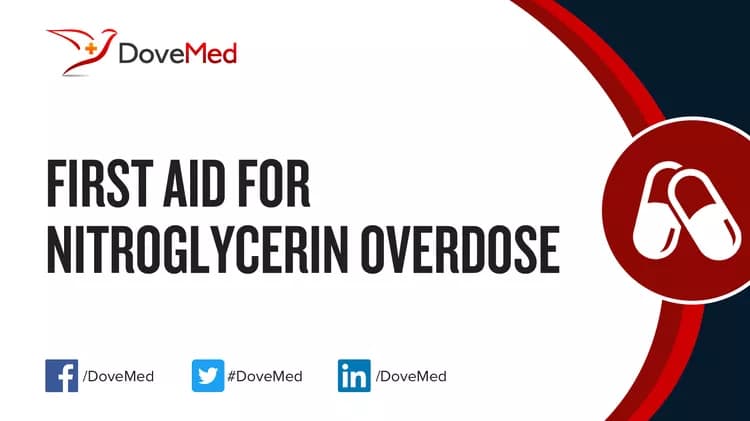What is Nitroglycerin Overdose?
- Nitroglycerin drug is used as a vasodilator (to relax the blood vessels) in treating heart conditions including chest pain (angina), heart failure, and heart attack. The drug is normally consumed by placing below one’s tongue (sublingual drug)
- Nitroglycerin Overdose is the accidental or intentional intake of the drug in dosage higher than prescribed values
- The condition is diagnosed based upon the clinical history, combination of signs and symptoms, and additional tests (that may include, in some cases, radiological studies and laboratory tests)
What are the Causes of Nitroglycerin Overdose?
- Nitroglycerin Overdose is caused by the intake of nitroglycerin containing drug in dosage that is higher than prescribed
- This intake could be accidental, or in some cases intentional, to bring self-harm
- It is sold as Deponit, Minitran, Nitro-Bid, Nitrocine, Nitrodisc, Nitro-Dur, Nitrogard, Nitroglyn, Nitrol, Nitrolingual, Nitrong, Nitrostat, Transderm-Nitro, and Tridil among others
Note: The drug can interact with other prescribed or non-prescribed medications in the body. Such interactions may enhance the therapeutic effects of the drug or other medications being taken, resulting in undesired side effects (such as an overdose).
What are the Signs and Symptoms of Nitroglycerin Overdose?
The signs and symptoms of Nitroglycerin Overdose can vary from one individual to another. It may be mild in some and severe in others. Several systems of the body, such as the digestive system, nervous system, vascular system, respiratory system, and skin and ENT may be affected.
The signs and symptoms of Nitroglycerin Overdose may include
- Appetite loss
- Nausea, vomiting
- Abdominal cramping
- Increased or slow heartbeats
- Decreased blood pressure (hypotension)
- Labored or shallow breathing
- Confusion and increased nervousness
- Seizures
- Dizziness, feeling faint
- Flushed skin, the skin may be cold
- Bluish discoloration of the lips and skin beneath the nails
- Vision abnormalities including blurred or double vision
- Involuntary eye movements
- Coma
How is First Aid administered for Nitroglycerin Overdose?
First Aid tips for Nitroglycerin Overdose:
- If the individual with Nitroglycerin Overdose is in a coma, or is experiencing life-threatening symptoms, call 911 (or your local emergency help number) immediately
- Call the Poison Control Center at 1-800-222-1222 (or your local poison control center) for further instructions
- Provide them with information such as dosage, type of drug taken, strength and time of ingestion of medication, age, weight and general health status of affected individual
- Confirm that the airways are protected; also, ensure breathing and the presence of pulse
- Unless instructed by a healthcare professional, DO NOT induce vomiting in the affected individual
- Take individual to emergency room (ER) for further treatment
- Always try to take the medication strip/bottle/container to the ER
The emergency medical health professional might perform the following steps towards treating the condition:
- Gastric lavage for elimination of drug from the stomach (irrigation using special solutions)
- Medically manage symptoms, such as abnormal heart rate and seizures
- Provide breathing support, if necessary
- Administer activated charcoal to avoid absorbance of drug in the body
- Administer laxatives for elimination of drug from the body
- Administer fluids by an intravenous drip line
Who should administer First Aid for Nitroglycerin Overdose?
First aid for Nitroglycerin Overdose is administered by healthcare professionals.
- The individual who overdosed, or someone near, should call 911 for emergency assistance (or the local emergency number)
- They should also call the poison control center at 1-800-222-1222 (or the local poison control center) and follow instructions
What is the Prognosis of Nitroglycerin Overdose?
Nitroglycerin Overdose is usually not a life-threatening condition and once symptoms are managed adequately, the prognosis is mostly good.
- Nevertheless, the prognosis is dependent on the amount of drug consumed, time between overdose and treatment, severity of the symptoms, as well as general health status of the patient
- Occasionally, severe cases of Nitroglycerin Overdose are known to be fatal
In general, overdoses are common situations in the emergency departments. A majority of the cases are often not fatal, when appropriate treatment is given.
How can Nitroglycerin Overdose be Prevented?
Nitroglycerin Overdose can be prevented by:
- Always taking the right dose of medication at recommended times
- Avoiding drugs that might interact with nitroglycerin
- Talking to your healthcare provider, if recommended dose of nitroglycerin does not provide adequate relief
- Refrain from self-medication
- Exercising caution while taking multiple drugs with nitroglycerin
- Keeping medications out of reach of children in child-proof containers
- For older individuals and those who tend to be forgetful, medications should be stored in single dose containers with time labels, to avoid multiple dosage
- Monitor intake of this drug especially in patients, who have depression or harbor suicidal thoughts and behavior
It is important to give your healthcare provider a complete list of prescription and non-prescription medications that are being currently taken. This will help them in assessing the possible drug interactions within various medications and help avoid/prevent accidental or unintentional toxic drug effects.
What are certain Crucial Steps to be followed?
- Call 911 (or your local emergency number) for emergency assistance, if symptoms are life-threatening
- Call Poison Control Center at 1-800-222-1222 (or the local poison control center) and follow the recommend steps
- It would be helpful if the following information is readily available:
- Type, dosage and time of administration of medication
- Age and weight of the individual
- And, the overall health status of the individual
Related Articles
Test Your Knowledge
Asked by users
Related Centers
Related Specialties
Related Physicians
Related Procedures
Related Resources
Join DoveHubs
and connect with fellow professionals


0 Comments
Please log in to post a comment.